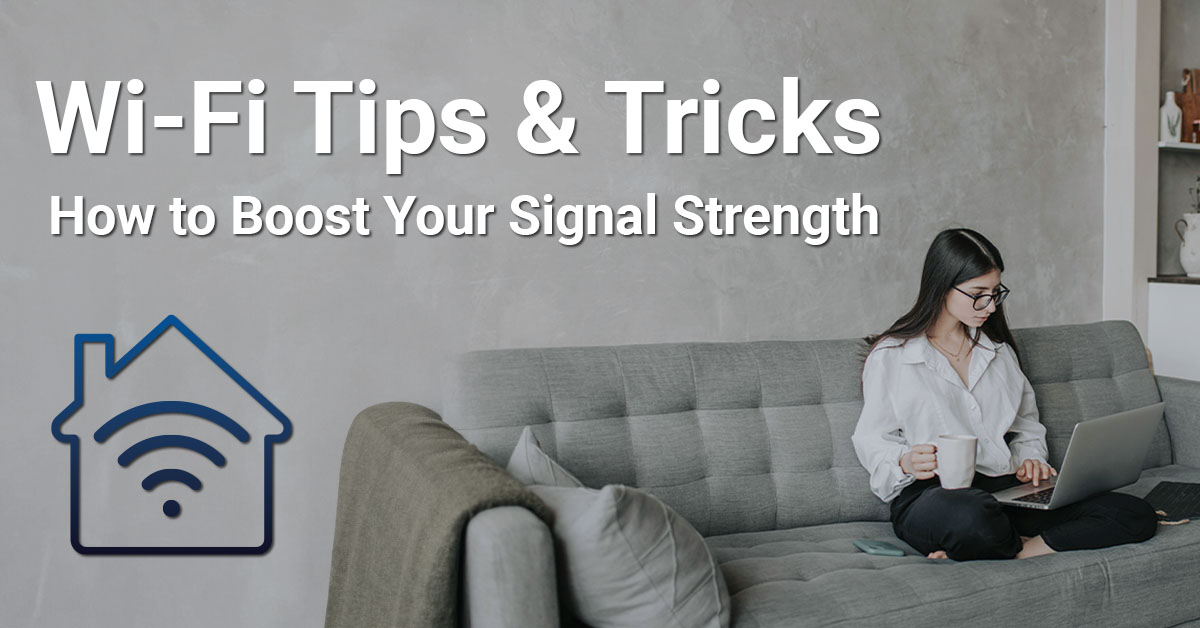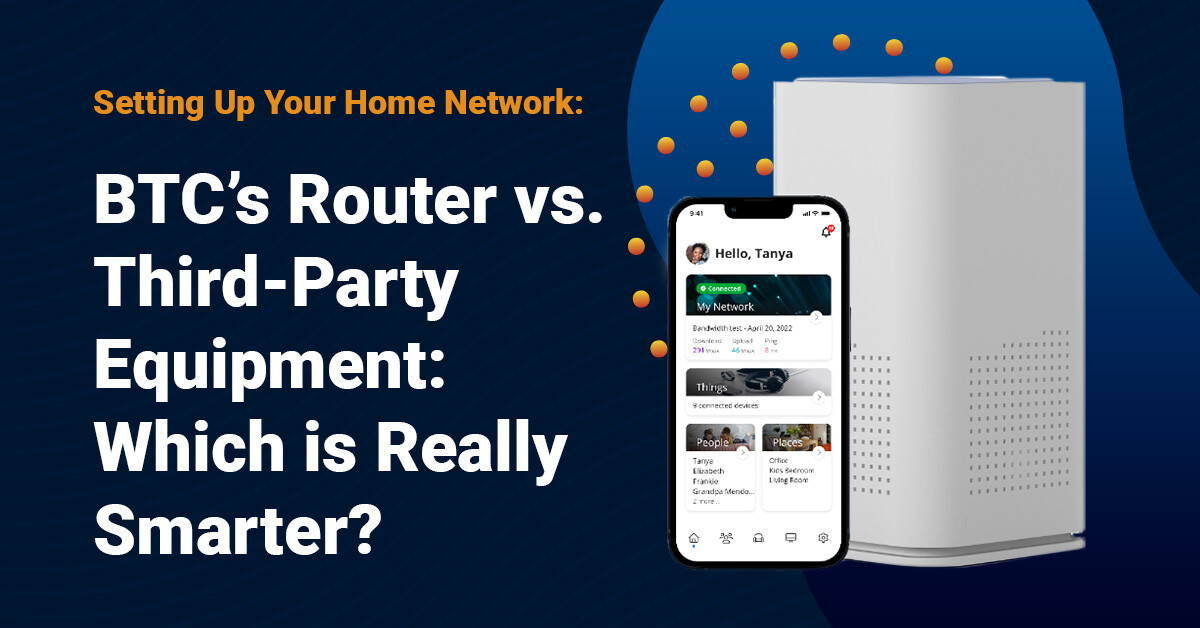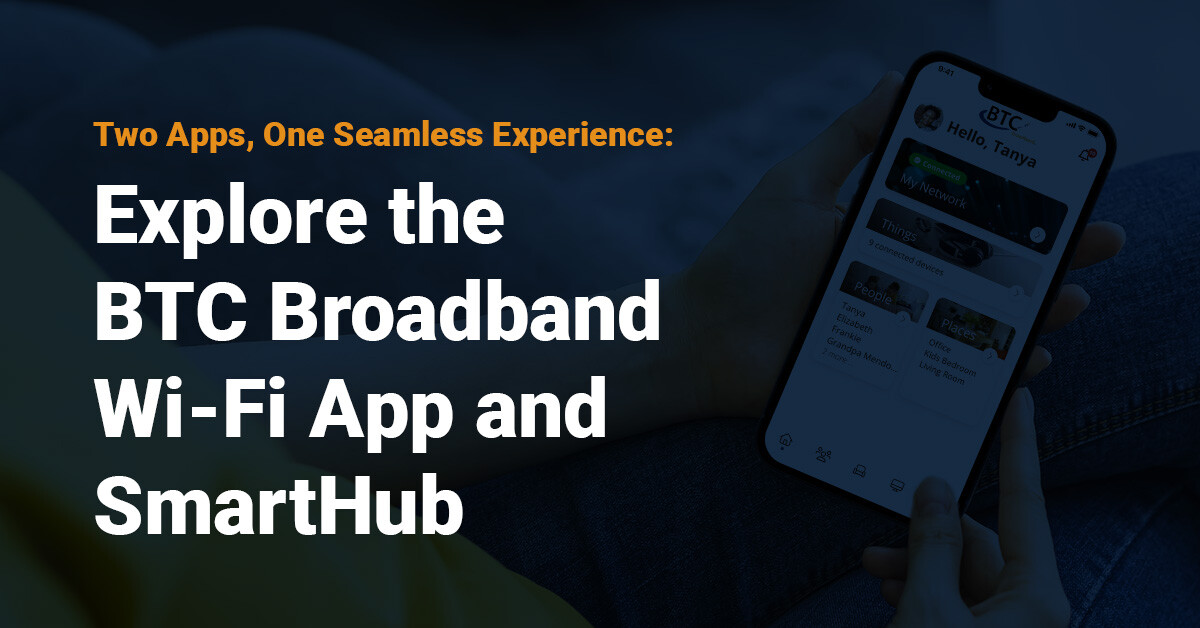Reliability Redefined: Choosing BTC Broadband Over 5G Home Internet

There has been a lot of talk about cellular home internet, commonly referred to as "5G home internet" from major cellular companies like T-Mobile and Verizon, but what does that mean for consumers, and how does it compare to Wired Internet? Let's talk about it!
Understanding the Difference: 5G Home Internet vs. Wired Internet
5G home internet functions like a fixed wireless connection, relying solely on cell towers, unlike a wired internet connection, which uses physical cables to deliver internet to your home. Relying only on a cellular network means you'll experience potential signal fluctuations. You’re sharing the same bandwidth with all cellular users, so it's similar to what you might encounter with your mobile phone's internet. As we explain further in detail throughout this blog post, you will quickly see why choosing a wired solution, such as BTC Broadband, can provide a much more stable and reliable internet experience for your home internet use.
Environmental Factors Impacting 5G Home Internet Connectivity
Since cellular home internet works by using signals from cell towers, again, much like your cellular devices, it can be susceptible to environmental interferences. Understanding the impact on cellular home internet connectivity is crucial for users seeking reliability.
Here are some factors that can severely affect the reliability of cellular home internet:

Weather Conditions
Rain, storms, and fog.

Obstructions and Physical Barriers
Trees, foliage, buildings, and structures.

Interference from Other Wireless Devices
The presence of other devices on similar frequencies.

Distance from the Transmission Source
Increased distance may weaken 5G signals.

Topography
Uneven or hilly landscapes may impact line-of-sight communication.
The Advantage of BTC Broadband:
Speed & Reliability
At BTC Broadband, our dedication to ensuring a consistently reliable internet experience is clear. Our fiber-optic network is at the core of our reliability, setting us apart from the uncertainties that 5G home internet solutions may encounter. Here's why our approach is preferred:
Durable Internet LinesMobile Speed with Assurance
Comparing 5G home internet to wired home internet is like comparing apples to oranges; it is not a true comparison.
There are fundamental differences between these two types of internet connections. 5G relies on wireless signals transmitted from cell towers, which can be affected by various external factors such as weather, obstructions, and other interferences. On the other hand, wired home internet involves physical cables connecting directly from the service provider's network infrastructure to your home, offering a more stable and consistent connection.
The analogy of apples to oranges emphasizes that these two technologies have distinct characteristics and operate in different ways. It's not just about personal preferences; it's about recognizing that each technology serves a unique purpose and has specific strengths and limitations. Wired internet, like what BTC Broadband offers, tends to provide a more reliable and consistent performance compared to the potential fluctuations associated with 5G home internet.

Why is a home Wi-Fi connection required to push software updates on a cellular device?
Cellular companies often advise users to connect to home Wi-Fi when performing software updates due to the inherent limitations of cellular networks. When a device is connected to a cellular network, the available bandwidth is shared among all users in a particular area. Software updates can be data-intensive processes, and downloading large files over a cellular connection can lead to slower speeds for everyone in that vicinity.
Using home Wi-Fi for software updates is required by the cellular companies because home wi-fi typically offers a more stable and faster connection compared to cellular data. Wi-Fi connections within a home environment are not as susceptible to external interferences, ensuring a smoother and quicker download process.
These recommendations highlight the distinct capabilities of each type of network and advise users to leverage the strengths of home Wi-Fi for certain data-intensive tasks, recognizing that it provides a more reliable and efficient experience for activities like software updates.

Making an Informed Choice: 5G Home Internet vs. BTC Broadband
As we navigate the overabundance of internet choices, it is crucial to shed light on the distinctions between cellular home internet and BTC Broadband, emphasizing why the latter stands out as a superior option for a reliable and consistent online experience. Let us weigh the pros and cons!
What You Get with BTC Home Internet:
Reliability
BTC Broadband ensures a consistently reliable internet experience through a cutting-edge fiber-optic network.
Stable Connections
BTC’s buried lines minimize vulnerabilities associated with above-ground cables or wireless signals.
Speed Assurance
With BTC, what you pay for is what you get— a superior and uninterrupted online experience along with unbeatable pricing.
What you risk with 5G Home Internet:
Uncertain Speeds
5G Home Internet solutions may come with varying speeds, leading to uncertainties and potential interruptions in your online connectivity.
Cost
With 5G Home Internet, you pay the same price regardless of the speeds you are actually getting, making this option less cost-effective.
Wireless Vulnerabilities
There are many factors that could cause interference on a daily basis as mentioned above.
FAQ's
What is 5G, and am I really getting it?
5G, or fifth-generation cellular technology, represents the latest advancement in cellular connectivity. Designed primarily for mobile applications, it can also function as a home internet connection. However, it's important to note that true 5G availability is not guaranteed everywhere.
There are many internet related terms out there, let's break a few of them down:
• 5G: Fifth generation cellular technology
• 5 Gbps: 5 gigabits per second, which denotes internet speed.
• 5 GB: 5 gigabytes of data usage/storage
• 5 GHz: WiFi frequency (shorter coverage area but faster speeds than 2.4GHz WiFi frequency)
Do 5G Home Internet providers engage in network prioritization, meaning that the company puts mobile users ahead of 5G Home Internet users?
In managing network traffic and congestion, cellular providers do prioritize users on their network. T-Mobile openly acknowledges this prioritization strategy, giving precedence to customers on their mobile plans over customers subscribed to their 5G Home Internet plans. As a result, 5G Home Internet customers may experience reduced speeds particularly during network congestion.
Does BTC Broadband offer 5G Home Internet?
BTC provides wired home internet connection that outpaces and outperforms 5G Home Internet Connections.
The superiority lies in the wired infrastructure offered by BTC, which is inherently faster and more reliable than 5G Home Internet - which is reliant on a cellular signal.
Are there situations when I cannot use 5G Home Internet?
To maintain optimal network availability for all customers, certain activities that may harm or excessively congest the network will be restricted.
Specifically, 5G Home Internet is not recommended for unattended use, automatic data feeds, automated machine-to-machine connections, or any usage that automatically consumes an unreasonable amount of available network capacity.
What this means for the everyday consumers is if you have devices such as a security camera you will have to consistently disconnect these devices to be able to optimize your bandwidth.



